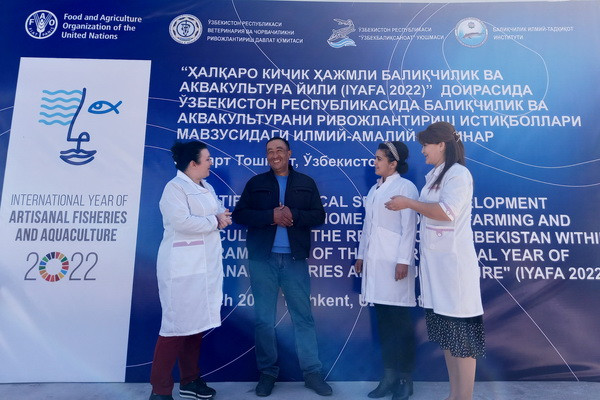
FAO marked the International Year of Artisanal Fisheries and Aquaculture in Uzbekistan
Tashkent, Uzbekistan (UzDaily.com) -- On 30 March 2022 a workshop was carried out in the Research Institute of Fisheries of Uzbekistan that brought together key stakeholders and focused on the prospects for the development of artisanal fish farming and aquaculture in the Republic of Uzbekistan within the framework of the International Year of Artisanal Fisheries and Aquaculture (IYAFA 2022). The workshop was organized by the Food and Agriculture Organization of the United Nations (FAO) in part within the scope of the FISHCap project (Capacity Building for Sustainable Fisheries and Aquaculture Management in Central Asia, Azerbaijan and Turkey). The FISHCap project is part of the FAO-Turkey Partnership Programme on Food and Agriculture (FTPP II), funded by the Government of the Republic of Turkey and aims to encourage collaboration between the private and public sector.
The FISHCap project contributes to the implementation of the Uzbekistan Presidential Decree dated January 13, 2022 No. PP-83 “On additional measures for the further development of the fishing industry”, which is aimed at increasing the export potential of the fishing industry, supporting domestic fish farming and aquaculture and increasing the volume of breeding fish based on intensive technologies.
The United Nations General Assembly has declared IYAFA 2022. This initiative aims to focus world attention on the role that small-scale fishers, fish farmers and fish workers play in food security and nutrition, poverty eradication and sustainable use of natural resources – thereby increasing global understanding and action to support them.
“Celebrating International Year of Artisanal Fisheries and Aquaculture gives important recognition to the millions of small-scale fishers, fish farmers and fish workers who provide healthy and nutritious food to billions of people and contribute to achieving food security. This initiative is also an opportunity to enhance dialogue between small-scale producers of fish production. It is important to make their voices heard at all levels, so they can influence the decisions and policies that shape their everyday lives”, - Sherzod Umarov, Assistant FAO Representative noted.
The workshop provided a platform for FAO experts, specialists from the State committee of veterinary and livestock development and Association “Uzbekbaliqsanoat”, professors, scientific researchers and fish farmers to discuss prospects for the development of domestic fish farming and aquaculture as well as activities planning to promote artisanal fisheries and aquaculture in the country. The workshop participants were informed about the history and significance of the International Year of Artisanal Fisheries and Aquaculture. During the workshop farmers were introduced to intensive methods of growing fish in household conditions, they also discussed feed bases, prevention of fish diseases and other topical issues.
“Small-scale fisheries and aquaculture sector collectively produce a great bulk of global fish production while providing 90 percent of sectoral employment. There are some views that the sector has been largely ignored in policy, governance and development. However there has been increasing focus and importance given to the secor over the last decade. FAO Voluntary Guidelines for Securing Sustainable Small-Scale Fisheries in the Context of Food Security and Poverty Eradication, enforced in 2014 by FAO, is an landmark success in due recognition of the sector. The sector needs to position itself to overcome the increasing challenges while consider new development opportunities”, - Haydar Fersoy, FAO Senior Fishery and Aquaculture Officer said.
After the workshop participants were invited to visit the exhibition of scientific developments and achievements in intensive aquaculture in Uzbekistan. They also familiarized with the structural subdivisions of the Research Institute of Fisheries, including the laboratory complex established with FAO support, aquariums, hatchery, sturgeon and the other facilities.